UMD research focused on improving the safety and quality of pasture-raised food products
- Oct 3, 2025
- 1 min read
Source: University of Maryland College of Agriculture and Natural Resources
by Graham Binder
Most American food is no longer grown on those picturesque farms where chickens cluck and scratch the soil next to beds of lush vegetables, and goats and pigs bleat and oink in their nearby pens. But such "integrated crop-livestock" farms (ICLF) are making a comeback, and supplying meat and produce to more and more people, especially through farmers’ markets and co-ops. But today, the production of animals and plants in close proximity poses health risks to consumers that farmers of an earlier time may never have faced, as antimicrobial resistance and bacterial infections are becoming more common on small farms.

Now, through a new $935,000 grant from the United States Department of Agriculture (USDA), a University of Maryland team will set out to eliminate some of the shortcomings of ICLF’s. Through a variety of applied tactics, they aim to improve the safety and quality of pasture food products grown in small ICLFs, giving statewide farmers and consumers greater confidence in the food they grow and eat.
“We have found that many pathogens are highly present in integrated small farm products,” said Dr. Debabrata Biswas, project director on the grant. “Some chicken processors are not following proper safety procedures like hand washing, changing clothes or boots, or washing with the right kind of water to kill the pathogens, and then they are going back to the produce farm and harvesting spinach or lettuce. Many of the folks working on the farm are not properly trained.”











































Comments